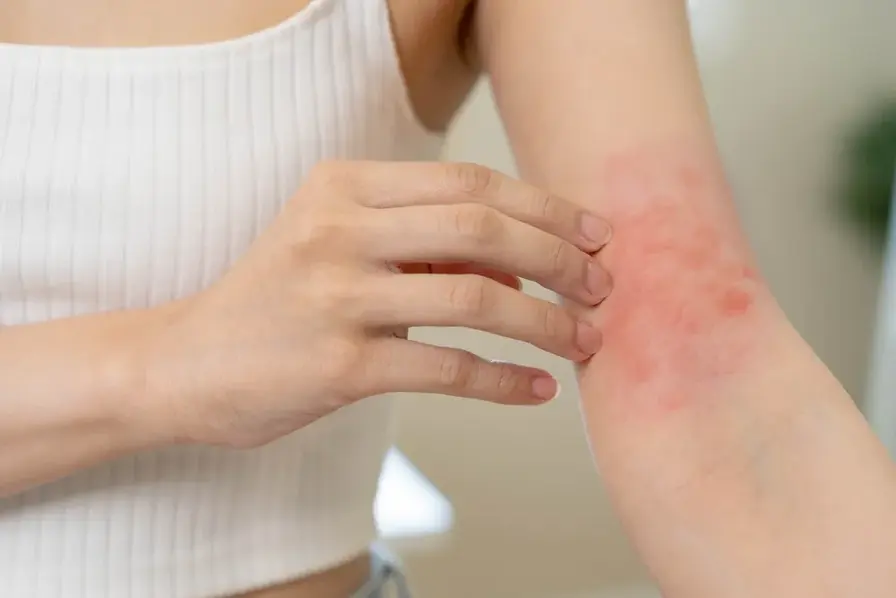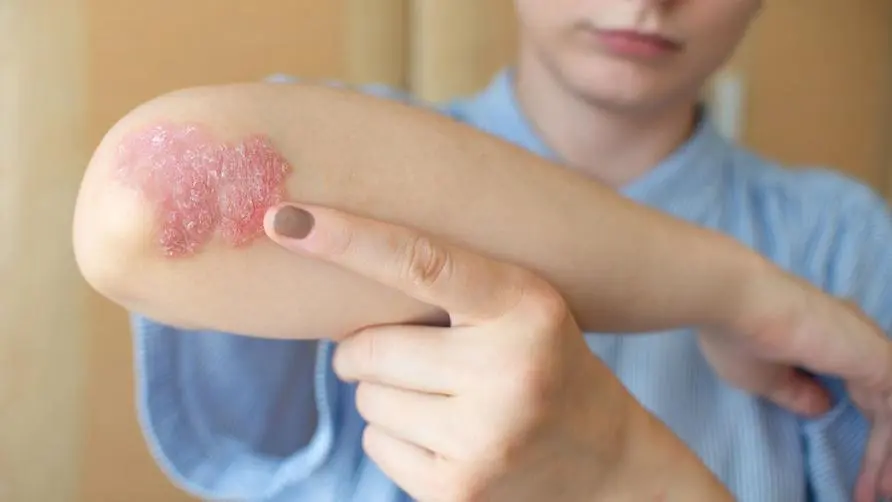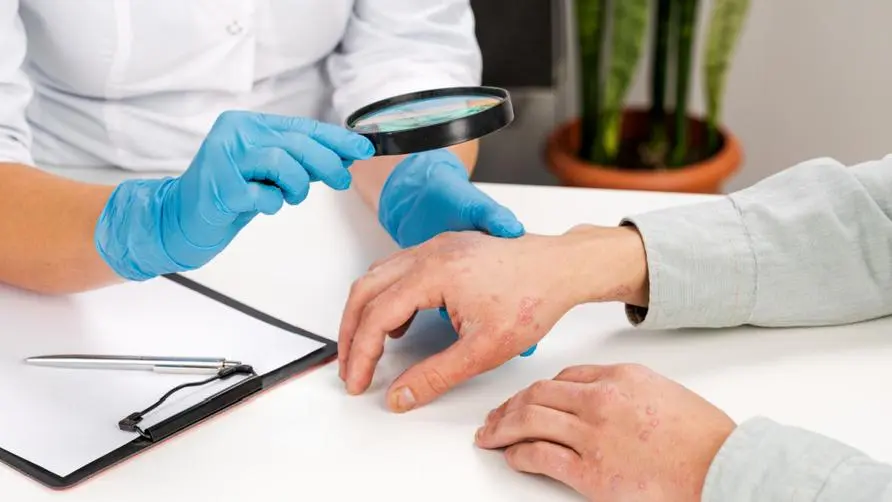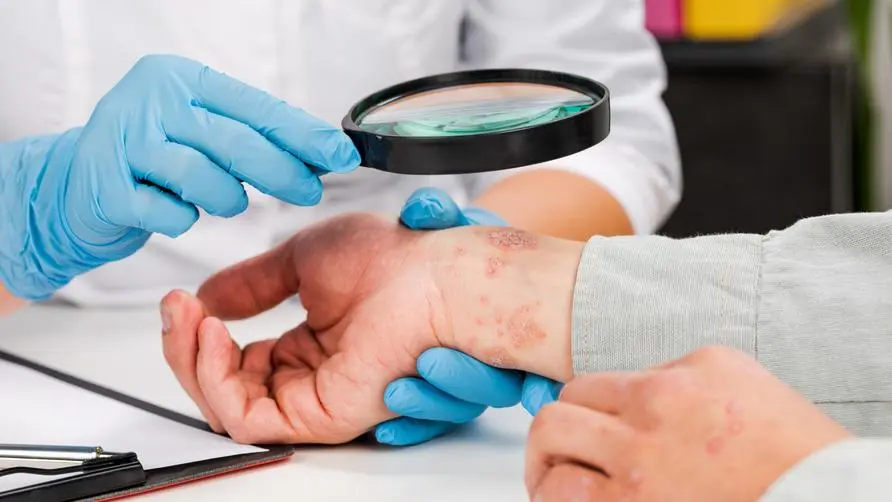I never thought that skin diseases can be life-threatening! "This kind of psoriasis" required her to be intubated and use extracorporeal membrane oxygenation to survive.
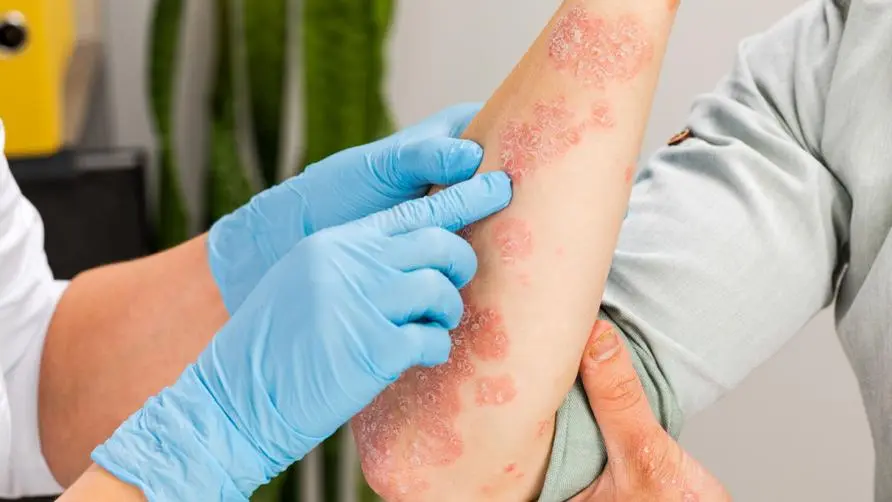
33-year-old Ms. Chen developed skin abnormalities during her confinement period. Pustules spread from around her eyes, mouth, and neck to her elbows and buttocks, and her skin folds and joints were severely ulcerated. At first I visited 2 or 3 dermatology clinics, but the results were not satisfactory after several treatments. After being hospitalized at the doctor’s recommendation, I was finally diagnosed with “generalized pustular psoriasis.” During the treatment, due to low immunity, I had to be sent to the intensive care unit for intubation and extracorporeal membrane oxygenation. After a month of tug-of-war with death, Only then did he save his life.
Zhao Xiaoqiu, chairman of the Taiwan Dermatology Association, said that generalized pustular psoriasis (GPP) is a severe skin disease that affects the entire body and inside. According to statistics, there are about 500 patients in Taiwan. The acute attack period is not only the course of the disease but It develops violently, and the symptoms last for a long time (the pustules do not subside for more than 3 months), and they also have the characteristics of irregular recurrence.
Severe skin disease GPP may be accompanied by fatal complications: 3 out of 10 patients in Taiwan delay diagnosis for half a year
Dr. Huang Yuhui, director of the Taiwan Dermatology Association and associate professor-level attending physician at the Department of Dermatology, Taipei Linkou Chang Gung Memorial Hospital, explained that systemic pustular psoriasis is a rare autoimmune inflammatory disease that mostly affects adults aged 40 to 60 years old, especially women. The proportion of sick people is higher. If the disease is not treated in time, it may be seriously complicated by fatal complications such as sepsis, heart, lung, and kidney multiple organ failure. It can be said that “the longer it is delayed, the more dangerous it is.”
However, the causes of generalized pustular psoriasis are diverse and unpredictable, such as genetic factors, pregnancy, stress, environment, drug influence, and even infection with the new coronavirus, which may lead to disease attacks. Dr. Huang Yuhui pointed out that the report shows that patients with generalized pustular psoriasis in Taiwan need to see an average of 3 doctors for a diagnosis; even 3 out of 10 patients take more than half a year to be diagnosed, which shows that the public’s awareness of generalized pustular psoriasis has increased. Awareness of ringworm is urgent.
“Some of the symptoms of generalized pustular psoriasis are similar to those of general plaque psoriasis, such as redness and scaling of the affected skin area, so it is often mistaken for general psoriasis, and typical pustular symptoms are often regarded as infection. Treatment.” Dr. Huang Yuhui said that he has seen patients seek herbal remedies or folk remedies, but the result is immune imbalance and a significant worsening of symptoms. It is clear that there is still much room for efforts in the promotion of correct disease health education.
The first priority of GPP treatment is to quickly control acute attacks and target the IL-36 inflammatory pathway for precise treatment.
Dr. Huang Yuhui emphasized that different patients have different attack frequencies. More than 70% of patients will have “severe acute attacks” several times within 2 years, and it is currently difficult to effectively predict or prevent them. Once the disease occurs, a large number of dense pustules will quickly appear on the skin, accompanied by cutting and burning pain. Nearly 50% of patients are unable to take care of themselves or work during an acute attack; up to 1/3 of patients still have symptoms after receiving systemic treatment. Pustules remain.
Therefore, for patients with generalized pustules, providing a treatment plan that can quickly eliminate pustules and prevent recurrence is an important issue to improve the current situation. In the past, systemic pustular psoriasis lacked proprietary therapeutic drugs and had limitations in controlling acute attacks. The treatment may be slow in effect and may cause recurrence risks at any time. Dr. Chen Junbin, an attending physician at the Dermatology Department of Taipei Linkou Chang Gung Memorial Hospital, also pointed out that most of the existing drugs are designed to target the IL-17 and IL-23 inflammatory pathways of general psoriasis, and it is actually difficult to prescribe the right medicine.
Fortunately, at this stage, the medical community has discovered the key pathogenic mechanism of systemic pustular psoriasis: the “IL-36” inflammatory pathway. Based on this inflammatory pathway, special biological agents are developed to help block the inflammatory response more accurately. Achieve rapid control of acute attacks. Clinical trials have shown that more than 50% of patients treated with this biological agent during the acute attack phase can completely eliminate pustular symptoms in the first week.
Dr. Chen Junbin said that this biological agent not only has the opportunity to make the patient’s skin regenerate, but also helps to significantly relieve pain and improve the quality of life. After 3 months of treatment, it is expected to maintain pustule clearance for up to 12 weeks, helping patients manage acute attacks more effectively and return to normal life sooner. Recently, there was a 28-year-old female patient. After receiving special biological agent treatment, the pustules were completely eliminated within a week, and it has remained free of recurrence for nearly half a year.
“This patient has developed pustules repeatedly on his body since he became ill 6 years ago. When the pustules on his body stick to his clothes, the skin will tear when he moves, making it difficult to walk and stand. Even with painkillers and analgesic injections , other biological agents, etc. cannot provide quick relief, and the patient has to be hospitalized more than twice a year on average, causing life and financial burdens. “The therapeutic effect of specialized biological agents also allows patients to return to work and return to normal life.
Doctors urge you to be alert to 6 major symptoms! Learn to optimize GPP diagnosis and treatment
Dr. Chen Junbin reminded that the symptoms of generalized pustular psoriasis are serious, and the accompanying complications are also dangerous and fatal. Therefore, correct diagnosis and early treatment are critical to the management of acute attacks of generalized pustular psoriasis, and called on the public to pay attention. Six typical symptoms: large areas of pustules, erythema, and scaling on the skin, as well as systemic symptoms such as pain, fever, and fatigue.
Chairman Zhao Xiaoqiu also said that if the above symptoms occur, you should immediately go to a dermatologist for further diagnosis. There are also special biological agents for systemic pustular psoriasis that target the “IL-36” inflammatory pathway, which is suitable for people who have suffered from repeated acute attacks for a long time. It brings new hope for treatment to suffering patients. In the future, the society will also strive to develop the “Treatment Guidelines for Generalized Pustular Psoriasis”, hoping to help diagnose and treat generalized pustular psoriasis and establish a more complete treatment environment for patients.
Further reading:


